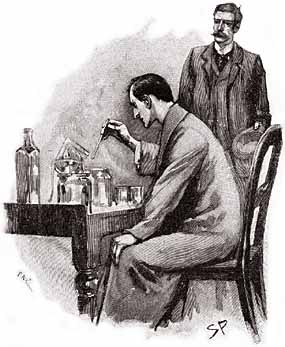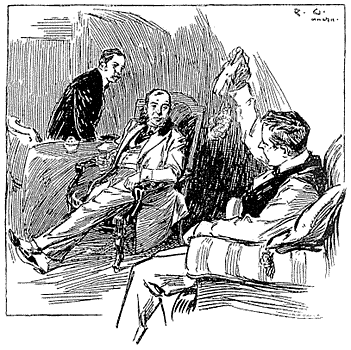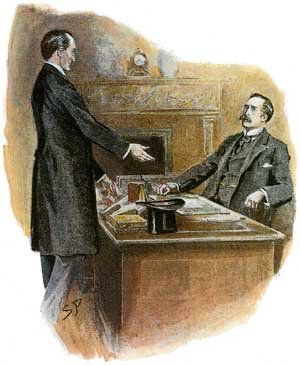Most of us, if we’re honest with ourselves, wouldn’t have been able to live with Sherlock Holmes for very long. I’m sure there would always be a stalwart few who would soldier on under any circumstance – convinced that the benefits of living with the Great Detective would far outweigh any “minor” annoyances. But I’m not one of them. When I was in college, I had a roommate that inexplicably began leaving the peanut butter in the refrigerator and the resulting animosity nearly ended our now decades-long friendship. (Sorry Claire, but have you ever tried to spread cold peanut butter? Have you?) So, if I’m clearly that sensitive about my sandwiches, can you imagine how I feel about my personal possessions, my living space, my life? The first time I arrived at Baker Street to find the sitting room filled with papers and noxious chemical fumes, 221B would suddenly be minus one tenant.
 |
| Clean. Up. NOW. |
But certainly some eccentricities are more serious than others. It is one thing, for example, to cleverly execute a disguise in the semblance of a wizened, old sailor (SIGN) or elderly woman (MAZA). Watson, after all, is always so amused when Holmes sheds a disguise to reveal himself beneath it. Amused, and often charmingly befuddled. As in The Sign of Four, when the cantankerous sailor in the Baker Street sitting room is replaced with the Detective, Watson says, “Holmes! […] You here! But where is the old man?” Is it a tribute to Sherlock Holmes’s skill in the art of disguise, or to Dr. Watson’s guilelessness that he cannot, at first, conceive that his friend might have played a lighthearted trick on him? On the other hand, Watson does get angry with Holmes, earlier in the same story, when he presents Holmes with a pocket watch and asks him to deduce what he can of the watch’s former owner. Holmes is successful, of course, in divining the existence of Watson’s unfortunate older brother. At first Watson is furious – convinced that Holmes already somehow knew about his sibling and is trying to play him for a fool – but once Holmes reveals precisely how he made his deductions, Watson is contrite: “It is as clear as daylight… I regret the injustice which I did you. I should have had more faith in your marvellous faculty.”
 |
| Holmes, quit waving that fake beard at me. I need to figure out where that old man went! |
 |
| "I'm not dead! Let's have dinner." |
There’s a range of trickery and deception present in the Canon, but for the most part, Dr. Watson’s reactions to those instances don’t seem to vary. Rather than turning to a discussion about the reliability of Watson as a narrator (perhaps he did slug Holmes at the conclusion of DYIN, but if he left it out of the manuscript, how would the reader ever know?), is it equally as likely that Watson merely understood Holmes’s process even more than he would ever let himself realize? The deductive steps may have always been a mystery to him in varying degrees (such as his reaction to Holmes’s pocket watch analysis), but that didn’t mean he didn’t appreciate the result. Watson could have wasted valuable time and energy getting upset when Holmes let him run about Dartmoor to seemingly little end, or he could just skip right to being relieved that Holmes had arrived. What is the benefit in arguing whether or not Watson should have been angry about Holmes’s three-year deception, when the fact remains that he was, in fact, overjoyed to see his friend? Whenever Holmes managed to mislead Watson, whether it was a small trick of disguise or a large-scale deception, the Doctor was always able to move right to the necessity of it. And he was invaluable to the Detective’s process by always appreciating the art of it.
oOo
“Better Holmes & Gardens” now has its own Facebook page. Join by “Liking” the page here, and receive all the latest updates, news, and Sherlockian tidbits.

You know, it only just dawned on me how much Jeremy Brett mimics the "arms out" pose in EMPT.
ReplyDeleteAnd you have to wonder about Watson's family background. I always got the impression that remembering his brother was a painful thing, and that was behind his reaction. And his willingness to accept all sorts of difficult behavior...something in your background teaches you to do that, at least at first. In the end, fortunately, Holmes isn't abusive or anything...he's just quirky and rather thoughtless. But it's fascinating how, in the end, their needs and personalities mesh together...and not in a slashy way, either.
Is Watson overly patient, immensely kind, too laid back? Maybe all three. I couldn't live with Holmes either, except maybe if I were a fly on the wall.
ReplyDeletePerhaps Watson was an early practitioner of Rational Emotive Therapy and forestalled hostile emotions by slaying such irrational thoughts as "My friend should have told me he wasn't at the bottom of the falls" or "My friend should have let me know he was back in town rather than appearing in costume."
ReplyDeleteThanks for this altogether witty and warmly humane reading of their interactions involving the trickster side of Holmes.